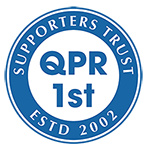QPR1st was among representatives of supporter groups from eight London clubs to meet with members of the Metropolitan and British Transport Police yesterday to discuss the policing of football matches. Issues discussed included stewarding standards, policing of areas around football grounds and their costs, filming supporters, and flares.
The police reported the number of football related incidents was falling in London and across the country – while the number of protests against football owners was rising.
The police were asked about the costs of policing matches. We were told the police will only charge clubs when the club has asked them to attend in the stadium itself or areas outside that are owned by the club. But, this could change. A High Court judgment in July related to Ipswich decided the police could charge the club for their presence on streets outside the stadium. A chief inspector said the Metropolitan Police was not considering a change of policy now – the Ipswich ruling was subject to appeal – but it is looking at which roads might be affected in case there is a change in the future. That could, of course, mean greater costs for QPR given the closed rounds around Loftus Road on a matchday.
It was also disclosed that the policing around the Olympic stadium for West Ham games takes three times the resources that had been needed at Upton Park. Those costs are not borne by West Ham, as the deal that gave them use the of the stadium means all policing and stewarding costs are met by the taxpayer. So, West Ham will not be affected by possible increased policing for every other club.
A representative of the Football Supporters Federation told the meeting they were seeing a reduction in complaints about the police – but an increase in complaints about stewards; who are now providing many of the duties previously done by the police. There was concern that police officers had not taken seriously complaints by supporters about bad behaviour by stewards. A chief inspector said that if a steward was responsible for an assault then that should be reported to the police. The police would take it seriously if it was a genuine assault. A police officer might not be able to respond straightaway police if he or she was dealing with a disturbance.
Other point raised included:
Millwall supporters raised the issue of police filming them even some distance from the ground. A police officer said there had been specific problems, for example, when police tried to go into some pubs they found “they had not been welcome.” They could not tolerate no-go areas and the filming was part of enhanced policing.
In a discussion about flares, the police said away supporters for many clubs brought flares to games. People needed to realise they can cause burns and people have suffered through smoke inhalation. Serious injuries had taken place in other parts of Europe where flares are a bigger problem.
The British Transport Police have on occasion obliged away supporters to get on a train, when they have tickets for a later train. A Transport Police officer said when this happened, the police would normally tell staff on the train. An FSF representative said supporters should note the number of an official car that tells them to get on a train in this way – to help in arguing against having to pay an additional fare.
They would look into the possibility of officers responsible for each club having their own twitter accounts.
At the meeting were supporters from Arsenal, Charlton, Chelsea, Leyton Orient, Spurs, West Ham and Wimbledon as well as from QPR1st.
